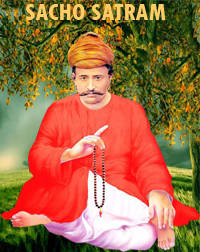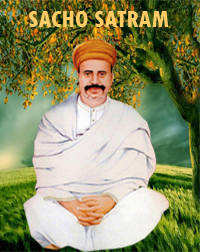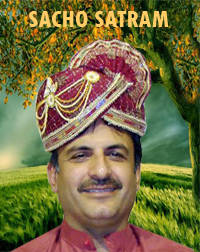In one of his profoundly inspiring Satsangs, Hazir Swaroop Sai Sadhram Saheb beautifully explained the significance of a well-known saying in Hindu Dharma: that attaining a human birth requires passing through 83,99,999 other life forms. He elaborated that in each of these forms, all the good deeds we performed were meticulously accounted for, enabling our gradual evolution from one life form to another, each one better than the last, until we finally earned the precious gift of human life.
After passing through 83,99,999 life forms and attaining the human form, the impressions of those previous lives remain imprinted on our minds, often influencing our thoughts and behavior.
For instance, a person exhibiting power and strength is often likened to a lion. Someone who speaks sweetly is compared to an Asian Koel or a Common Hawk-Cuckoo. A person who frequently shifts sides or opinions is associated with a chameleon. while a deceitful individual is likened to a wolf. Similarly, someone who speaks bitterly is often compared to a crow.
Saijan explained that human behavior is often compared to the traits of other creatures or living beings. For instance, if a person lacks patience and habitually fights or attacks others, they are said to exhibit the traits of an impatient animal known for biting. It isn’t even necessary to name the animal explicitly; merely describing its behavior is enough to convey the comparison.
These examples highlight how the human mind is deeply influenced by the lingering impressions of its previous 83,99,999 life forms.
In the human form, a single human struggles to manage the profound impacts of 83,99,999 previous life forms and
that is why God blesses humans with a powerful intellect to wisely navigate and manage the effects and impressions of their previous life forms.
Hazir Swaroop Sai Sadhram Saheb observed that it is fascinating how every animal, bird, and insect has unique traits and distinct food preferences. For instance, a lion exclusively eats meat, while a goat feeds only on grass and vegetables. Similarly, different birds have varied diets—some consume grains, others fruits, seeds, or worms. Each creature follows its specific dietary habits. However, humans are unique in that they consume almost anything, including, tragically, even human flesh. This, he explained, is due to the accumulated influences and impressions from the 8,399,999 other life forms they pass through before attaining human birth.
Saijan explained that humans are not merely human beings; each individual is a culmination of 8,399,999 other forms of life. Every person carries within them the traits and impressions of these 83,99,999 life forms.
Thus, every human being carries the behavioral traits of 8,399,999 other life forms. This is why God has blessed humans with great intellect—so that, by using this intellect, one can control the traits and habits of these other life forms within, harness inner wisdom to improve life, and elevate the standard of human existence, much like a lotus flower that rises from the mud.
Hazir Swaroop Sai Sadhram Saheb beautifully illustrated the significance of human wisdom and intelligence in comparison to the 8,399,999 other life forms. He used a tug of war as an example: When one person is on one side and many others on the other, it’s not surprising when the larger group easily pulls the individual toward them. However, if that one person possesses great power and effortlessly pulls the entire group toward him, he earns immense admiration and praise. That person, as Hazir Swaroop Sai Sadhram Saheb explained, is called a Sant, a Darvesh, or a Master. Because he reached the human form after transcending all the other life forms through good deeds, and upon becoming human, he successfully overcame all the traits of his previous lives, uprooted all his karmas, and ultimately attained greatness, becoming one with God. This highlights the profound significance of the human life form.
Sacho Satram



